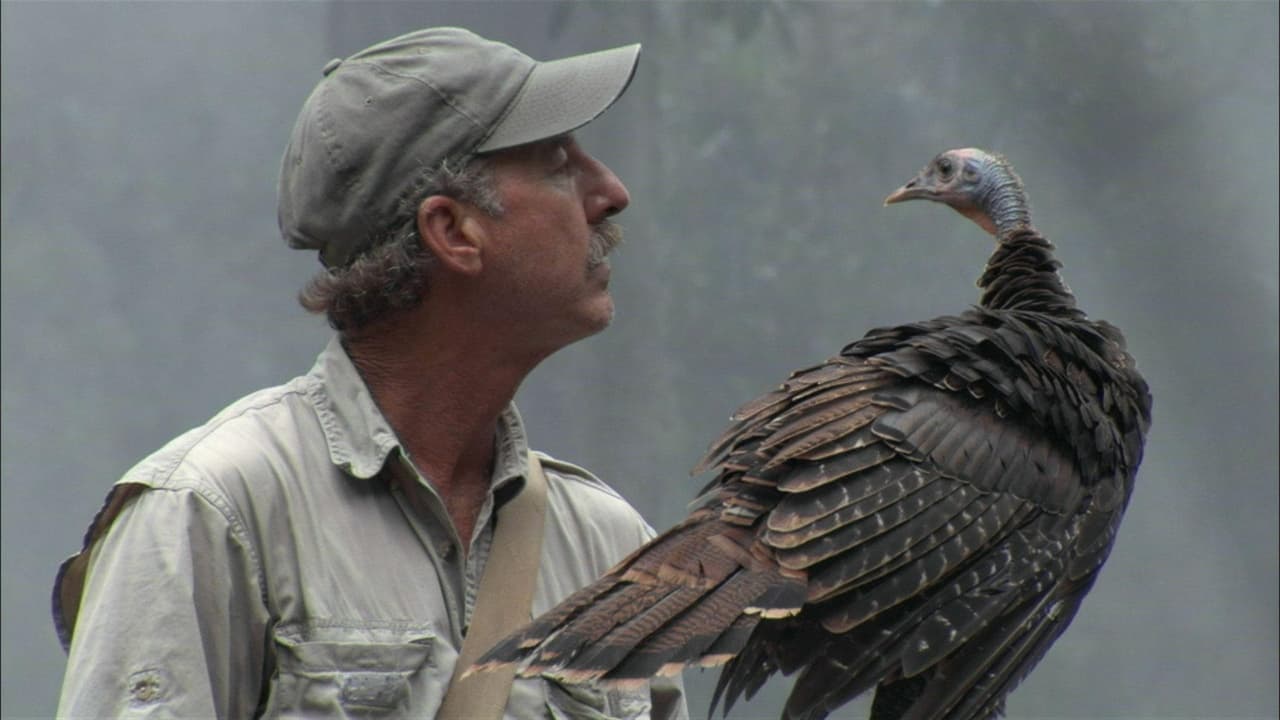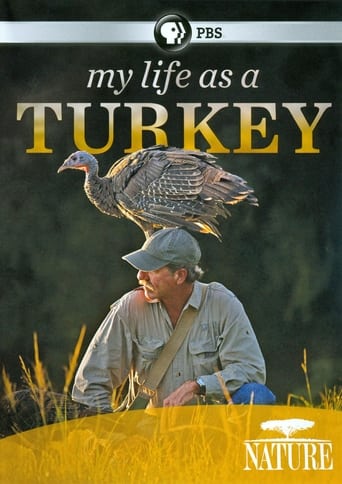

Anyone who thinks people are unique in nature should watch this amazing documentary.Writer Jim Hutto imprinted himself as "mother" to 16 wild-turkey hatchlings and raised them for more than a year before they scattered into the swamps of Florida.The sensitive yet non-sentimental Hutto remains somewhat of a puzzle throughout the film. He tells us practically nothing about himself except that for his year raising the poults he had no contact with humans. (By the end of the film, he's also eating live grasshoppers the way his chicks did.) We learn nothing about the life or family Hutto has left behind, nor how he paid for this experiment that changed his life.Hutto taught his brood to watch out for rattlesnakes and other predators. But it wasn't just the hens and jakes that benefited. "These animals showed me how to live my life," Hutto says.They did so by demonstrating the ability to be in the moment in a way that often eludes us forward-thinking humans. They're "curious about things that don't benefit their survival directly," examining the bones of dead animals and frolicking with fawns and squirrels. "There is no question in my mind," Hutto says, "these birds experienced joy in their lives." We also see them experiencing affection, concern, trepidation, and mourning, and vocalizing in 30 different calls that Hutto learned to mimic so as to foster communication and cohesion.This film opened my eyes to the subtleties of animals, including those we might not view as being intelligent. We'd understand these beings better, and identify with them more, if only we'd take the time to observe.
... View MoreOh my God, this is the best movie I've ever accidentally watched! I had no idea it even existed until the Masterpiece video I wanted to watch on the PBS website wasn't working, so I clicked through the other offerings and this came up on the Nature section.Naturalist Jim Hutto does on-camera narration to his experiment of a lifetime: While living in the very remote wilds of Florida, he was unexpectedly given a pan full of wild turkey eggs, and he incubated them, planning to let them imprint on him when they hatched so that he could study them closely.Little did he know that this would occupy his entire waking existence for the next two years! As the turkeys' de facto mother, Hutto becomes a literal Dr. Dolittle, learning and using all of the turkeys' myriad and subtle vocalizations, living with them from dawn to past their sleeptime every single day, and learning to live and see life through their eyes and hearts. Becoming a de facto wild turkey not only opens him up to their own fascinating existence, but it also opens a window into the other creatures of the forest: Escorted by the turkeys, he is welcomed by the rest of the forest-dwellers as one of them -- a condition that could never exist before the turkey experiment and never did after the two years were over and his brood was no longer with him.Like other animal-human bonding documentaries and films ('The Wild Parrots of Telegraph Hill' or 'Born Free' or 'Ring of Bright Water' or 'Gorillas in the Mist' come to mind), this film is charming, funny, moving, thought-provoking, and enormously enlightening. I think the qualitative difference here is manifold, however: Firstly, the subjects are wild turkeys, a species that not much was known about beforehand and that was and is presumed unintelligent by the average person; secondly, these animals are completely wild, not domesticated or coddled in any way; thirdly, Hutto, as their imprinted mother, was fully accepted by the animals as a turkey rather than a human, and he lived that way, in the wild, as a turkey. Hutto revels in the turkeys' in-the-moment existence and joie-de-vivre, finding it much more satisfying than the insane worries and regrets of human existence.I could go on, but let me simply conclude by saying this is definitely a movie any animal lover would enjoy! Beautifully filmed, as well.
... View More*Spoiler/plot- 2011, The film shows wildlife artist and naturalist Joe Hutto incubates two-dozen wild-turkey eggs with the intention of those young turkeys human-imprinting on him as their parent and he raising them to maturity to learn about the species. He has had a hope to learn about wild turkeys as their parent turkey. He arrived home to find a bowl filled with wild turkey eggs on his doorstep. He had difficulty getting eggs. He went out immediately to obtain an egg incubator to hatch the eggs into live turkeys. He began speaking with them even before they hatched, and bonded with them in their first birth moments. Then, day after day, for over a year, he lived as a turkey mother, taking on the full-time job of raising 16 turkey chicks. There was crisis, death, feeding, socialization, and many harsh lessons. He tried to learn their calls and their ways. He became about as close to being a turkey in human skin as was possible. Eventually, his poult children grew up, and Hutto had to let them go off on their own with a unforeseen ending.*Special Stars- Joe Hutto. *Theme- Turkeys are smart and learn fast.*Based on- Based on Hutto's book, "Illuminations in the Flatlands."*Trivia/location/goofs- Part of the Nature TV series. Featuring the special subspecies of wild turkey from the Florida swamp and flatlands. Shot in woodland Florida.*Emotion- A somewhat unforgettable documentary movie. This documentary film is the account of an amazing experiment. Based on a true story, this beautifully photographed, charming, funny, sad, and thought-provoking film explores when man and animal unwittingly become more closely linked than nature normally allows. It was harder than he ever imagined. It was an experience that would change his life. But the inter species relationship that develops his life so that he wonders who has imprinted on whom. And obtaining wild turkey eggs had proved to be next to impossible. The level of awareness and sensitivity of his young family to their natural world around them transcended anything he had experienced before. However, Mr. Hutto's loss of scientific objectivity was clearly seen in his wrong choices to overly mimic the turkey's insect diet, dominance actions, sexual behavior and competitive thinking. At that point midway through this film, it became something to ridicule and disbelieve by the audience. The film progressed further sadly not to be taken seriously by the public audience. The narrator and author should have spoke to any good turkey hunter as better preparation for this experiment. He was clearly naive and uninformed on his subjects. Unfortunately, I was reminded of another unfortunate nature documentary were an Alaskan Grizzly bear enthusiast that had studied the bears for many summers then developing an extreme hate of the Federal Park Rangers who regulate such doings. His final result was for him to become a grizzly bear 'human' meal (along with his wristwatch found in the bear's stomach) for his beloved wild Alaskan grizzly bears that he befriended and studied for years. YUK!
... View More